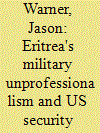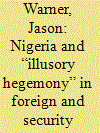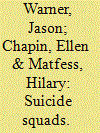|
|
|
Sort Order |
|
|
|
Items / Page
|
|
|
|
|
|
|
| Srl | Item |
| 1 |
ID:
180657


|
|
|
|
|
| Summary/Abstract |
In the study of terrorism, assassinations and suicide bombings have most commonly been considered as distinct phenomena. In practice, however, Al-Shabaab has shown a proclivity to use suicide bombings precisely as a means of assassination. But just how unique – if at all – is its use of suicide bombing assassinations (SBAs)? Using three unique databases on African suicide bombing combined with data from the Global Terrorism Database, this article seeks to understand the degree of uniqueness of Al-Shabaab’s SBA efforts from 2006 to 2020. In comparing Al-Shabaab to its nearest analogues – Boko Haram and Al-Qaeda in the Islamic Maghreb (AQIM) – across five different SBA metrics, this article demonstrates how Al-Shabaab is indeed rightly considered to be unique in its tendency to use suicide bombings as a tool for assassinations, at least on the African continent. It concludes by considering just what rationales underlie this proclivity, focusing on group-specific and environmental factors.
|
|
|
|
|
|
|
|
|
|
|
|
|
|
|
|
| 2 |
ID:
190863


|
|
|
|
|
| Summary/Abstract |
This article introduces the “Boko Haram disaggregation problem,” or the often frequent failure by observers to disaggregate the group following its August 2016 split into two distinct factions, instead, labeling and studying all factions as “Boko Haram.” It asks: What are the origins of the “Boko Haram disaggregation problem,” and, given this phenomenon, what are the possibilities and constraints in understanding profiles of violence between the pre-2016 and post-2016 iterations of the group(s)? It argues that the “Boko Haram disaggregation problem” has origins both internal and external to the group(s), most prevalent in quantitative academic research. Highlighting the challenges of this phenomenon, it uses data from the Global Terrorism Database (GTD) from 2009 to 2018 to compare profiles of violence between various “Boko Haram” factions. In sum, it shows why beyond merely a methodological challenge, overcoming this phenomenon has real-world impacts for addressing the violence perpetrated by these groups.
|
|
|
|
|
|
|
|
|
|
|
|
|
|
|
|
| 3 |
ID:
128229


|
|
|
|
|
| Publication |
2013.
|
| Summary/Abstract |
The United States military's Combined Joint Task Force - Horn of Africa (CJTF-HOA) is in need of capable and dependable regional military allies as it seeks to bring stability to the Horn of Africa. Eritrea - once a proclaimed US friend and home to one of Africa's largest military establishments - superficially seems to fit the bill. Drawing from literature on the 'unprofessional nature' of African militaries as well as the scant amount of open source material available on the notoriously secretive nation, this article argues that despite its experienced and well-funded military, President Isaias Afewerki's overbearing control of it has made Eritrea's military highly 'unprofessional' in various ways. As a result, a military that could be a useful US ally in a historically tenuous region will likely remain more of a problem than a boon for the United States into the foreseeable future.
|
|
|
|
|
|
|
|
|
|
|
|
|
|
|
|
| 4 |
ID:
153430


|
|
|
|
|
| Summary/Abstract |
Western observers of African foreign and security policy formation are often perplexed by African regimes’ reactions to insurgencies: the actions of the latter are often read to be duplicitous and self-damaging—and thus irrational—by the former. This article suggests that one cause for this perception rests in the often incomplete appreciation for certain Global South states’ self-identities as “regional hegemons,” which compels them to make foreign and security policy decisions based on maintaining the semblance of power projection capabilities to those in their intended spheres of influence. Particularly, this article suggests that when Global South states possess the realist attributes of a hegemon (military power, economic strength, and a large population) but lack the liberal attributes of a hegemon (the legitimacy for rightful rule), they often undertake a process here termed “illusory hegemony” or foreign and security policy prevarication. Yet, this pursuit of illusory hegemony frequently has the opposite unintended effect of undermining, rather than improving, the perception of rightful rule. This article combines an analysis of current events with International Relations theory and foreign policymaking analysis to present a case study on how Nigeria’s pursuit of its grand strategy of Pax-Nigeriana is being retarded by Boko Haram and the Chibok kidnappings, specifically as a result of Nigeria’s projection of “illusory hegemony.”
|
|
|
|
|
|
|
|
|
|
|
|
|
|
|
|
| 5 |
ID:
164066


|
|
|
|
|
| Summary/Abstract |
What strategic logics underlie terrorist groups’ use of linked suicide attacks? Are the goals that groups seek to achieve when sending linked bombing teams somehow inherently different than when sending individual suicide bombers? To answer these questions, this article introduces three typologies of linked suicide bomber detonation profiles—simultaneous, sequential, and nonproximate—and theorizes why terrorist groups might view each type of linked suicide bombing to be preferable to deploying a single suicide bomber. Improvements resulting from using an individual attacker include: ensuring a higher likelihood of successfully hitting a given target (simultaneous detonations); causing more casualties than a single bombing (sequential-wave detonations); and engendering wider-spread shock and awe (nonproximate detonations). Drawing on an original dataset detailing the entirety of Boko Haram’s suicide bombing efforts from 2011 to 2017, we then examine the extent to which these linked bombing typologies do actually appear to successfully lead to an improvement over the deployment of single suicide bombers. While we find that sequential-wave and nonproximate suicide bombings demonstrate evidence of hypothesized improvements over the deployment of single suicide bombers, our data show that deploying simultaneous suicide attackers does not lead to higher efficacy at targeting when compared to the deployment of individual bombers. In attempting to account for this fact, we argue that Boko Haram’s simultaneous detonation teams likely fail to show an improvement over single-bomber attacks because they tend to be composed of what we call “unenthusiastic and under-trained” bombers: teams of often uncommitted women, and sometimes children, which it deploys in tandem in a bid to avoid individual defection and increase the likelihood of at least one detonation in an attack. We conclude by suggesting what the process of linked bombing reveals about both terrorist groups in general and Boko Haram specifically.
|
|
|
|
|
|
|
|
|
|
|
|
|
|
|
|
|
|
|
|
|